Forget the Hits: Here is Animal Collective
31.01.08
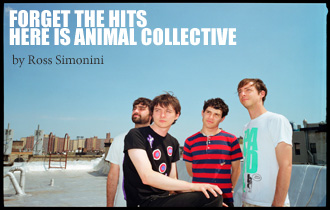 Most of the time, Animal Collective flat-out refuses to play songs from their albums at shows. While many bands spend tours acting as promotional mouthpieces, running through the highlights of their latest album, an AC show is a night of entirely new music, often in a new genre, and most likely, from an unexpected lineup of musicians. In this sense, the band is a step ahead of the record industry––something that tends to confuse industry folk, and causes inexperienced audience members to feel like they understand the band even less than they did when the show began.
Most of the time, Animal Collective flat-out refuses to play songs from their albums at shows. While many bands spend tours acting as promotional mouthpieces, running through the highlights of their latest album, an AC show is a night of entirely new music, often in a new genre, and most likely, from an unexpected lineup of musicians. In this sense, the band is a step ahead of the record industry––something that tends to confuse industry folk, and causes inexperienced audience members to feel like they understand the band even less than they did when the show began.
I took a two-day drive out to watch AC play a tiny bar in Salt Lake City because I wanted to be surprised. No way would I take that drive to watch indie rock band #782 run through the tracks of their latest album, note-for-predictable-note. Going to Animal Collective concerts isn’t about waiting to hear your long-loved feel-good chorus––“Oh, this is my favorite part!” – because you’re not going to hear the old favorites, the ones with the words you know. For this very reason, AC draws a group of fans who don’t just love albums or songs, but the actual musicians along with whatever creative whim those musicians feel like exploring. It’s a “relationship of trust,” and even though the band doesn’t improvise––in fact, they’re pretty adamant about not doing that––their performance ethic stirs up the same fervor as a jazz show or, maybe more appropriately, a Grateful Dead show, a comparison the band endorses. And like deadheads, AC fans follow the band from city to city, and spend hours logging onto the Collected Animals web forum, where they trade bootlegs, videos, setlists, and some deeply considered opinions about the new, live material. (Every so often, members of the band will even drop in to respond to questions or engage in week-long defensive debates about aesthetics with fans).
In SLC, before Animal Collective steps on stage, the guy next to me––bearded, in a hooded sweatshirt, sort of ragged-looking––starts giving me his behind-the-scenes superfan-take on the new material. He points at a group of his friends––all of whom look like they could be stand-ins for the band––and says that they all just came from another show in Colorado and that the band didn’t play any songs off of the then-most-recent album, Feels or the still-months-away album Strawberry Jam (which of course he already had a leaked copy of) and that most of the material sounded, to him, like hip-hop. He’s getting hyper while he explains all this, and just watching him, you can tell that, like all superfans, he feels as if he is a part of the “collective” itself, that the shows make him feel like he’s getting a true concert experience, the way people must have felt before recorded music even existed.
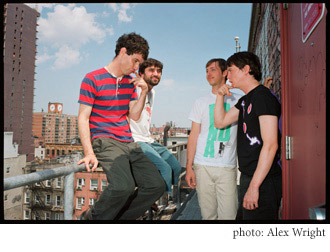 When the band finally comes out, it is only three (out of four) members––Dave Portner (a.k.a. Avey Tare), Noah Lennox (a.k.a. Panda Bear), and Brian Weitz (a.k.a. Geologist). Absent is AC’s most frequently-absent member, guitarist Josh Dibbs (a.k.a. Deakon), who has only been present on three out of the group’s eight albums. On the phone from NYC, Portner says suspiciously easy-going things such as, “Josh just needed some time away. We always respect each other’s space and we’re pretty used to having to change things up a lot and we accept that change. It makes things more natural and moves things and keeps things fresh.”
When the band finally comes out, it is only three (out of four) members––Dave Portner (a.k.a. Avey Tare), Noah Lennox (a.k.a. Panda Bear), and Brian Weitz (a.k.a. Geologist). Absent is AC’s most frequently-absent member, guitarist Josh Dibbs (a.k.a. Deakon), who has only been present on three out of the group’s eight albums. On the phone from NYC, Portner says suspiciously easy-going things such as, “Josh just needed some time away. We always respect each other’s space and we’re pretty used to having to change things up a lot and we accept that change. It makes things more natural and moves things and keeps things fresh.”
Before the music starts, Portner stands at center stage, prepping all his faders and hissing and “p-p-pa”-ing into his mic, when he spots the superfan kid standing at the foot of the stage, within kicking distance, and clearly recognizes him. “Oh my god,” he says. “You guys came again.” Superfan screams, and behind him, the rest of the crowd is already howling requests for really old tracks such as “Alvin Row” (off the first album) but the band mostly ignores them. At one point, before they start, Portner says: “Yeah, we get asked to play that song a lot,” but he lets it drop right there.
Where guitars have always tied the band to psych-rock and freak-folk pigeonholing, the three members of Animal Collective stand on stage with no guitars, a few drums, tables of old-school effects processors, and one keyboard, which Portner will play for about three seconds during the entire show. When the music starts up in a long techno-like crescendo, it comes solely from samplers: a fast, pulsing, hypnotic electronic sound that seems like it might be heard pumping from Optimo’s latest Euro-dance mixtape. All three members hunch over their processors and mixers, heads bobbing like a trio of DJs. One of them works a rhythm, another a melodic loop, and the third lays down a bed of environmental sounds (Porter describes these as “Sea creature sounds”), but it’s hard to pin down exactly who’s doing what. They let the samples slowly swell, tapping away on analog equipment (not a computer in sight), and then move to the drums––Portner to a conga, Lennox to his traditional standing version of a drumset––and minutes later, when the vocals kick in, soaking-wet with effects, it is a new Animal Collective altogether. “For a while we were just really trying to make guitars sounds as little like guitars as possible, just to get more of an electronic sound,” Porter says. “Now we’re getting completely away from the guitars. We weren’t able to take them anywhere new.”
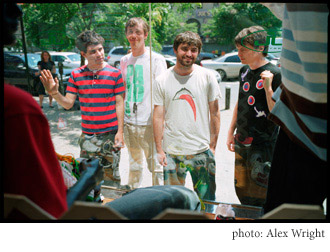 This is the same three-person lineup from the band’s Danse Manatee album (2003), but the music has almost no relation. Manatee captured the self-proclaimed “dark period” of the band, filled with scathing headache-inducing high frequencies and some of AC’s more abstract songwriting. It led to the even darker album, Here Comes the Indian, the band’s masterpiece by many fans’ standards––which, like Manatee, was mostly a guitar and keyboard album, with vocals serving as distant decorations. Since then, AC has abandoned all their brooding influences in favor of the jubilant demeanor, first with the feel-good folkiness on Sung Tongs and Campfire Songs, then with the psychedelic mania-rock of Feels, and finally into this new era of bouncing electronic music, which just started poking its head through on Strawberry Jam. “The songwriting process for us is always a little bit different,” Portner says. “For Strawberry Jam, it feels a little like there are Noah’s melodies and then there are my melodies. But now with this stuff [i.e., the live material] it feels very collaborative, at least in terms of the melodies. Almost like how we worked with Sung Tongs.”
This is the same three-person lineup from the band’s Danse Manatee album (2003), but the music has almost no relation. Manatee captured the self-proclaimed “dark period” of the band, filled with scathing headache-inducing high frequencies and some of AC’s more abstract songwriting. It led to the even darker album, Here Comes the Indian, the band’s masterpiece by many fans’ standards––which, like Manatee, was mostly a guitar and keyboard album, with vocals serving as distant decorations. Since then, AC has abandoned all their brooding influences in favor of the jubilant demeanor, first with the feel-good folkiness on Sung Tongs and Campfire Songs, then with the psychedelic mania-rock of Feels, and finally into this new era of bouncing electronic music, which just started poking its head through on Strawberry Jam. “The songwriting process for us is always a little bit different,” Portner says. “For Strawberry Jam, it feels a little like there are Noah’s melodies and then there are my melodies. But now with this stuff [i.e., the live material] it feels very collaborative, at least in terms of the melodies. Almost like how we worked with Sung Tongs.”
Although Panda Bear’s Person Pitch album is heavily reliant on samples from his record collection––with inclusions of everyone from Harry Belafonte to the Beach Boys––Portner makes it known that the new live Animal Collective sound vocabulary is derived not from other sources, but from their own compositions and field recordings. Weitz has always been the sound doctor, and Portner believes that much of the band’s new sound is due to Weitz’s switch from “electronic” samples to manipulated “acoustic” sounds that he records in parks, twilight forests and other such places. “We’re just trying to come at the sampling from every possible angle,” he says.
On stage, as the band uses samples to switch from one track to another, letting long taffy strands of Weitz’s noise connect the end of one song to the beginning of the next. They make eye contact, beaming as they process the samples of children laughing. It’s an undeniable energy, and where most bands have the glaze of automatons, running through the musical motions, AC brims with an ebullience of creativity, as they write their music right there, on stage. Half of the songs at the groups’ concerts aren’t even songs yet, just a minute-long verse or a snippet that the band’s considering developing into something larger. But they’re willing to set that unformed snippet in front of their fans, to see if the audience the audience swallows it or cringes. With the collection of AC live bootlegs floating around online, you can actually track these fragments and witness the development of specific musical material, following songs such as “Fireworks” change from a fast rock song one night in, say, Vancouver, to a slowed-down trance track the next week in, say, Nashville. Most of the songs off Strawberry Jam have an entire evolution to them––ten different recordings of ten versions with ten different names in ten different cities. Every show offers a slightly different perspective on the song’s core material––a different guitar part, a faster tempo, a new vocal effect, a brand-new section, a deleted backing vocal––until the band slowly settles on a final album-ready version. One of AC’s best-known tracks, “Purple Bottle” contained an entire live-verse referencing Stevie Wonder’s “I just called (to say I love you)” that wasn’t deleted until immediately before the recording.
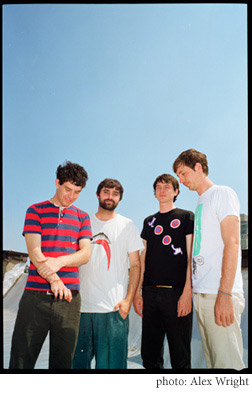 But here’s where the Animal Collective-Grateful Dead comparison crumbles a little. Whereas the Dead (and most jam bands) improvise around a certain fundamental structure of chords and melody––like bluegrass musicians––the Collective offers a view into the actual songwriting process. The structure itself is actually being built from show to show. This type of free-form concert-style leaves the band vulnerable to a severe type of criticism, since they perform tracks before they are finalized. And where jam bands might play a bad version of a song one night, AC might end up recording a version of the song that is less popular than one of fifteen previous bootleg versions, and thus disappointing superfans across the world. The best version of the song might be forever hidden in the haze of that one painfully hissy recording from that one night in Minnesota. It’s the possibility of failure that looms over all improvised experimental music, but it’s also why fans of this type of music develop such a vibrant, dynamic, and sometimes, overly critical relationship with their records.
But here’s where the Animal Collective-Grateful Dead comparison crumbles a little. Whereas the Dead (and most jam bands) improvise around a certain fundamental structure of chords and melody––like bluegrass musicians––the Collective offers a view into the actual songwriting process. The structure itself is actually being built from show to show. This type of free-form concert-style leaves the band vulnerable to a severe type of criticism, since they perform tracks before they are finalized. And where jam bands might play a bad version of a song one night, AC might end up recording a version of the song that is less popular than one of fifteen previous bootleg versions, and thus disappointing superfans across the world. The best version of the song might be forever hidden in the haze of that one painfully hissy recording from that one night in Minnesota. It’s the possibility of failure that looms over all improvised experimental music, but it’s also why fans of this type of music develop such a vibrant, dynamic, and sometimes, overly critical relationship with their records.
Sadly, the fans in Salt Lake City don’t take this so well. This is the first time the band has ever played Utah and the crowd doesn’t want to see the creative process at work, just want to sing along with the songs they know. After the show, I even hear some people trashing the set in the bathroom, and one guy, while pissing, says to his friend, “They haven’t played a single song from Feels all night,” and the friend responds, “Yeah, don’t they know that some of us only have the record that’s already out.”
Five months later, when the band tours for Strawberry Jam, their set is a little wiser and more refined. The interlude snippets the band toyed around with in SLC have evolved into full-fledged songs with choruses, verses, and some of the best collaborative vocals ever written by Portner and Lennox. Surprisingly, they actually acquiesce and play a few songs off of the three-day-old Strawberry Jam. Maybe the record execs at the band’s new mega-indie label Domino had a finger-wagging sit-down discussion about giving the fans what the want to hear. And in a way, the imaginary record execs are right––in those familiar moments, the crowd whistles and dances wildly with gratitude. There’s even a song or two from the back-back catalog––“Leaf House” was their closer . Still, all those old tracks have changed so dramatically that most fans don’t quite recognize them and just whisper and squint in confusion. Certain songs have adopted entirely new influences, like the heavy industrial or minimal techno sections of “Who could win a Rabbit” and you can just picture the albums that might be in rotation on the band’s tour bus, or imagine the moments when the band members thought, let’s turn this folk song into oonce-oonce house track. As a listener, hearing this process is the most exciting part of an AC concert, and as superfan guy knows, it’s the best way to truly get to know a band. Halfway through the show, when another fan barks out “Play ‘Grass’ for Christ’s sake,” and Portner quietly responds, “No, we don’t play that one,” I realize that I’m fully on Porter’s side. If I want to hear that one, I’ll put on the album.
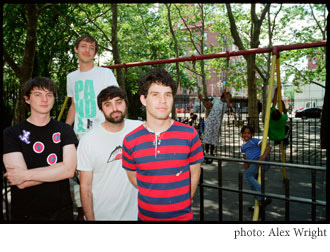 Note: The next step for the band, even after their not-yet-recorded electronic DJ trio album, is a long filmic collaboration with director Danny Perez. For those who have seen the band’s “Who could Win a Rabbit” video, which is sort of a bloody, monstrous interpretation of the Tortoise and the Hare, Perez’s horror movie aesthetic is familiar. The band themselves are intense fans of psychotropic films, spending much of their down-time on recording sessions watching old horror and sci-fi films with producer Scott Colburn. Portner uses words like “Schlocky” and “flamboyant” and “boisterous” to describe the Perez project and says it will probably include Animal Collective’s acting debut. When asked about the subject matter, he seems like he’s hiding something, but he lets me know, most of all, that “this is going to be more than just a forty-five minute music video”
Note: The next step for the band, even after their not-yet-recorded electronic DJ trio album, is a long filmic collaboration with director Danny Perez. For those who have seen the band’s “Who could Win a Rabbit” video, which is sort of a bloody, monstrous interpretation of the Tortoise and the Hare, Perez’s horror movie aesthetic is familiar. The band themselves are intense fans of psychotropic films, spending much of their down-time on recording sessions watching old horror and sci-fi films with producer Scott Colburn. Portner uses words like “Schlocky” and “flamboyant” and “boisterous” to describe the Perez project and says it will probably include Animal Collective’s acting debut. When asked about the subject matter, he seems like he’s hiding something, but he lets me know, most of all, that “this is going to be more than just a forty-five minute music video”
*All photos of AC by Alex Wright
More Links: Paw Tracks, Animal Collective on Myspace, and the new Animal Collective official website